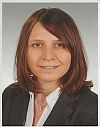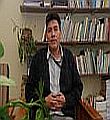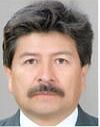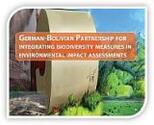Team

Dr. Christian Borgemeister graduated in Agriculture science at the Georg-August-University Göttingen, Germany, specialist in entomology, with a PhD from Leibniz University Hannover (LUH), Germany. His research focuses on biological control and integrated pest management (IPM) in the tropics for improved food security, and vector control of infectious diseases like malaria as part of a One Health approach. He has authored and co-authored > 120 papers in peer-reviewed journals, co-edited a book on the history of biological control in Africa, and contributed chapters to several scientific books. He is a Fellow of the African Academy of Sciences, the Royal Entomological Society, the Entomological Society of America, and a member of several national and international academic organisations. He was the Director General of icipe, the International Centre of Insect Physiology and Ecology, a pan-African R&D Centre headquartered in Nairobi, Kenya. After he served as a faculty member of Justus-Liebig University Giessen and LUH, and later as a scientist at the International Institute of Tropical Agriculture (IITA). He joined ZEF as Professor and Director of the Department of Ecology and Natural Resources Management and currently is part of ZEF’s triple directorate and responsible for the Department “C” Ecology and Natural Resources Management.

Dr. Vanesa Rodríguez Osuna environmental engineer (Catholic University of Bolivia), M.Sc. in Natural Resource Management and Technologies in the Tropics (Cologne University of Applied Sciences), PhD in Natural Sciences (University of Leipzig), Foreign Trade Manager and Project Manager Specialist. Her past and present work relates to the sustainable use of biodiversity, integrated land and water management, climate change, environmental and economic assessment of ecosystem services, environmental policy, environmental impact assessment, alternative market development and bridging the science-policy interface related to biodiversity and ecosystem services. Within these fields, she has worked as expert for the Deutsche Gesellschaft für Internationale Zusammenarbeit (GIZ), Conservation Strategy Fund (CSF), RARE, Intergovernmental Platform on Biodiversity and Ecosystem Services (IPBES) Secretariat/UNEP. Within the business sector, she has worked for SEQUA, the development agency of the four major German business associations and GIZ. Today, she leads a research project aiming at developing sustainable metrics to measure social and ecological impacts of global equities associated with water and biodiversity sponsored by UBS Sustainable Equities and in cooperation with Harvard’s Center for Health and Global Environment.
She is a former senior researcher at the Center for Development Research, University of Bonn (where she is still associated to) and is currently Senior Research Associate and Project Manager at CUNY advanced Science Research Center, New York.

Dr. Lisa Biber-Freudenberger analyzed and work with indicators for both, the protection and use of ecosystems as well as socio-economic conditions. As part of her research she focused on the interlinkages between the ecological and socio-economic system, developed concepts for nature conservation planning on different spatial levels and performed distribution analyses for species and ecosystems worldwide in the context of sustainable use of resources and human development.

Dr. Jan Henning Sommer; Senior Researcher at the Center for Development Research (ZEF), University of Bonn. He is a biologist and macro-ecologist with a focus on modelling the impact of climate change on biodiversity, involved in different activities related to Biodiversity and Human development, and in particular in capacity building in regard to the Intergovernmental Panel on Biodiversity and Ecosystem Services, IPBES.

M.Sc. Ing. Mauricio Azero completed postgraduate courses in Agricultural Economics at the Pontifical Catholic University of Chile, and Rural Economics at the Federal University of Viçosa, Brazil. He holds an Agronomy title from the Universidad Nacional del Sur, Argentina; Higher Education Diploma in the Bolivian Catholic University "San Pablo" (UCBSP) and Competency Education Diploma from the Comité Ejecutivo de la Universidad Boliviana, CEUB, Bolivia. He was Director of the Engineering Faculty at UCBSP. He is currently Director of the Environmental Engineering Department since and Lecturer of soil science. He coordinates projects in the area of sustainable production systems, climate change adaptation and improvement of biological soil quality. He is part of the board, founding member, and past national coordinator of the National Network Shared Space in Agroforestry Systems (ECO-SAF), a network promoting agroforestry systems as an alternative to agricultural production with less environmental impact. Board Member of the Departmental Council for the Environment. He was a consultant and project coordinator of several institutions, including the Unidad de Análisis de Políticas Sociales y Económicas (UDAPE, Bolivia), Swiss Agency for Development and Cooperation (COSUDE) and Deutsche Gesellschaft für Internationale Zusammenarbeit (GIZ).

M.Sc. Miguel Angel Delgado Rodriguez has a background in Biology and experience of over 20 years in Environmental Impact Assessment and environmental management, mainly related to the Energy sector. His regular activities combine work in this sector as an expert in energy and environment, as well as teaching at the Bolivian Catholic University, Cochabamba, in the Environmental Engineering Career. His research interests are related to sustainable programs, environmental impact assessment, environmental management, planning and renewable energies. In recent times, he has been involved in the development of renewable energy projects, mainly related to wind power. He has been interested in environmental law since the beginning of his career and has represented Bolivia before international organizations on issues related to energy and environment.

Dr. Gonzalo Navarro is a field scientist, PhD in Biology (Universidad Complutense de Madrid, Spain), specialized in Natural Ecosystems Survey and Environmental Impact Assessment (University of Sevilla, Spain). He also holds a Teaching Certificate (Universidad Complutense de Madrid) and a Diploma in Higher Education (Bolivian Catholic University, Cochabamba). His areas of research are primarily field biology, ecology, vegetation classification and mapping, biogeography, conservation and sustainable management of ecosystems, landscape ecology, environmental impact assessment, plant taxonomy and teaching. In these areas, he has worked in Bolivia and neighboring countries, producing over fifty publications, including books, scientific articles, and the first vegetation map at a scale of 1:250 000 produced for an entire country in South America. He has also worked as a consultant for various institutions such as: The Nature Conservancy (TNC), World Wildlife Conservation (WWF), NatureServe, Wildlife Conservation Society (WCS), Foundation of Friends of Nature (FAN, Bolivia), Government of Bolivia (National Protected Areas, Ministry of Environment and Water), Departmental Government of Santa Cruz (Bolivia), Organization of American States (OAS), the Andean Community of Nations (CAN), Deutsche Gesellschaft für Internationale Zusammenarbeit (GIZ), and Interamerican Biodiversity Network (IABIN). He is also a lecturer at Universidad Complutense de Madrid (Spain), Mayor de San Simón in Cochabamba (Bolivia), Simón I. Patiño of Cochabamba and Bolivian Catholic University “San Pablo”, also in Cochabamba. He received the following awards: Premio “M. Cárdenas” al aporte en el conocimiento de la Botánica en Bolivia (Cochabamba, 2009) and VII Premio Iberoamericano de Botánica “J. Celestino Mutis” (Spain, 2015).

Ana Maria Michel Vargas has a degree in Biology, M.Sc. in Environmental Sanitation, Master in Teacher Training and Educational Innovation; Diploma in Higher Education; Specialist Diploma in Disaster Risk Management and Climate Change Adaptation; Diploma in Civilizational Paradigms, Climate Change and Restoring the Balance of Mother Earth within the framework of Living Well. In the past, she worked in different industries such as PIL, FINO, Dillman, UMSS in Cochabamba, Bolivia. She began her work as a lecturer at the Bolivian Catholic University in the Career of Environmental Engineering and the Catholic Superior Normal Institute “Sedes Sapientiae” (INSCSS) in the Biology, Chemistry and Physics subjects. She also teaches in the Spatial Planning and Environment and Biology Careers at Mayor de San Simón University in Cochabamba. She worked as an Environmental Consultant in public (SERNAP, UMSS, ENDE, SEMAPA) and private (ENERGY, EMBOL Coca Cola, SDB SA, CIDEDER) institutions. She has published reports in the academic and environmental fields. Currently, she works as a technician in the Management Unit and Environmental Control (UGCA) in the Departmental Secretariat for the Rights of Mother Earth (SDDMT), Autonomous Government of Cochabamba (GADC).

Estela Herbas Baeny is a part-time lecturer at the Bolivian Catholic University since 2006. She teaches mainly the Research and Degree Workshop courses. She is an environmental consultant, biologist from the Mayor de San Simón University and “Director of the Department of Environmental Engineering- Bolivian Catholic University, Cochabamba-Bolivia”. She also has postgraduate studies in environmental management. She has a 14-year-profesional expertise in environmental consultancies (with environmental system analysis, management and assessment proficiency). She has recently participated in projects such as: a) Water quality and environment as determinant variables in the health of the department of Potosí; b) Quality assessment and water classification proposal of the Rocha River; c) Determination of environmental indicators for integral projects in the area of influence of the Misicuni Project; d) Environmental assessment and quality control within the area of the influence of the Well Drilling Project; e) Biophysical diagnosis, natural and transformed physical component of various projects; f) Development of environmental strategies and others. Nowadays, she works in discriminant spatial analysis for the assessment of the sensitivity of biodiversity in hydro-electrical projects. She has also been involved in research projects such as the development of water quality monitoring systems using aquatic macroinvertebrates. Ion 2011, she received an award from the Executive Committee of the Bolivian University for her research and scientific production.

Candan Ergeneman is a junior researcher and PhD student at the Center for Development Research (ZEF), University of Bonn. She is an environmental engineer (Middle East Technical University, Turkey) and holds an MBA (University of Mannheim) degree. She has eight years of professional experience as a field engineer and impact assessment specialist. She worked in Europe, Middle East and Africa with stakeholders such as private investors, development banks and governments for their oil exploration, energy generation, rural electrification and natural resources management planning projects.




